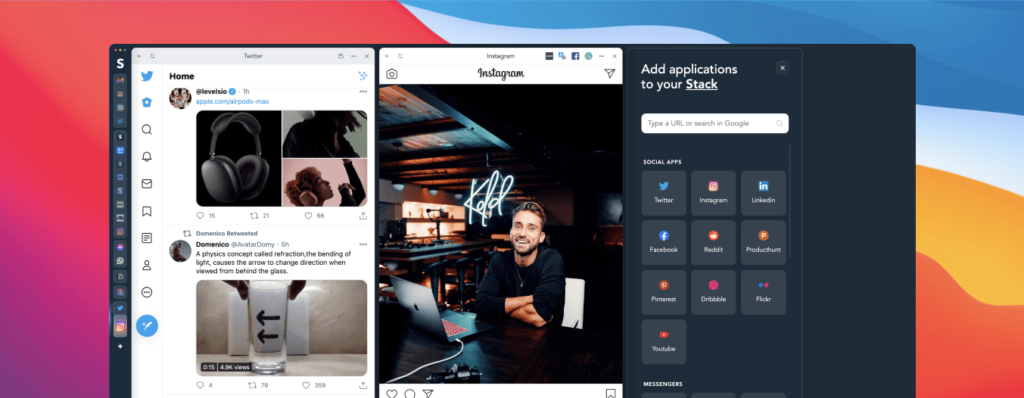
Many of us are living our lives online through a browser jam-packed with open tabs and have come to accept it as an inevitable new normal. But there is nothing normal about it.
Seeing a ton of open tabs in the corner of our eyes not only distracts us from the task at hand but is also detrimental to our mental health as it generates a crushing weight of psychological pressure, leaving us panicky, overwhelmed, and disorganized.
Now there is a new browser in town called Stack that wants to help us escape the grip of “tab hell” and make sure that our attention is not pulled in different directions and our productivity is not dragged down while using the Internet.
“Browsers were not built to be used in the way we are using them now. They were designed 20 years ago for browsing, but we’re not just browsing anymore. We are working with different types of applications such as email, social media platforms, and messaging apps,” Dachi Gubadze, co-founder and chief operating officer at Stack, told 150sec.
He believes the discrepancy between the evolution of user behavior online and browsers has led to a “messy Internet experience”, which is only getting worse as the number of applications people use on a daily basis keeps increasing.
And Gubadze says it is startups who can offer creative solutions in this space as big industry players have “very little incentive” to improve. “Conventional browsers are not changing what they’ve been doing because this has been working for them for quite some time.”
Cards, Stacks, Spaces
Stack describes itself as “more than a browser”. Instead of tabs, it has Cards that are aligned side-by-side. To organize Cards, it has Stacks. So a Stack is essentially a row of cards. And Stacks together create Space, which feels like a 3D operating system.
These three main components of Stack enables users to organize all their web applications and reduces the load on their devices.
‘A browser for productivity’
George Laliashvili, chief executive officer at Stack, says their solution is a “smart browser for productivity” but is evolving into a “browser for both productivity and collaboration” to facilitate productive cooperation between team members.
There are three factors that can help increase productivity, he said, adding that they all have been taken into consideration while developing Stack.
“If you want to be productive online, first and foremost, you should be focused. Multitasking is a serious drain on productivity because it makes you lose focus. Secondly, you have to be organized, knowing where your web content is.”
The third factor, in his opinion, is the ability to easily and intuitively navigate through and access the web content without spending unnecessary time and energy, which are “precious, limited resources”.
Stack’s shortcuts, which Laliashvili says are very easy to use for both techies and less tech-savvy users, are designed for this very purpose.
“In fact, you don’t even have to know multiple shortcuts in Stack. You have to know only one shortcut, and then you will be able to communicate with that shortcut in human language. It’s a little bit difficult to imagine, but we have tried to make it possible for people to speak to the computer in their native language, not the computer language. You can give commands to the browser, and it will take you wherever you want.”
In addition, Stack enables users to protect their privacy and avoid being tracked from the web applications they use. They can also enable their favorite chrome extensions in Stack, mute all their apps or each card individually, and set a custom refresh timer to monitor multiple news feeds, media channels, or trading platforms.
Spaces for different purposes
Stack, which is backed by Wayra X of Telefonica, also helps solve another issue that many people are struggling with in the era of remote and hybrid working: setting boundaries between work and personal life.
Laliashvili explained different kinds of Spaces can be created in their tab-less browser and that a single click is all it takes to switch between them.
“If you use 10 applications or websites for work, you can bring them together in a Space called ‘Working Space’, for example. When you’re done with your work, you can switch to a different Space labeled ‘Home or Fun Space’, which could include applications such as the messaging apps you use to communicate with your friends and family or streaming services like Netflix.”
Any competition?
When asked about their competition, Gubadze said there are few browsers that are trying to develop a similar solution but have not been launched yet.
For now, he says their biggest rivals are conventional browsers whose tab features have shaped user behavior that is very difficult to change.
That is why, according to him, Stack is enlisting the help of trendsetters and micro-influencers who they hope will be able to act as their ambassadors and help educate more users about the benefits of using the browser.
Stack’s COO argues what distinguishes them from potential future competitors is their expert team as well as their community of users who actively communicate with them and provide constant feedback and suggestions.
The Amsterdam-based entrepreneurs said they have a long list of features queued and encouraged Internet users to not get stuck with outdated tools and embrace more efficient ones that can make their experience online hassle-free and add real value to their lives.
Disclosure: This article mentions a client of an Espacio portfolio company.








